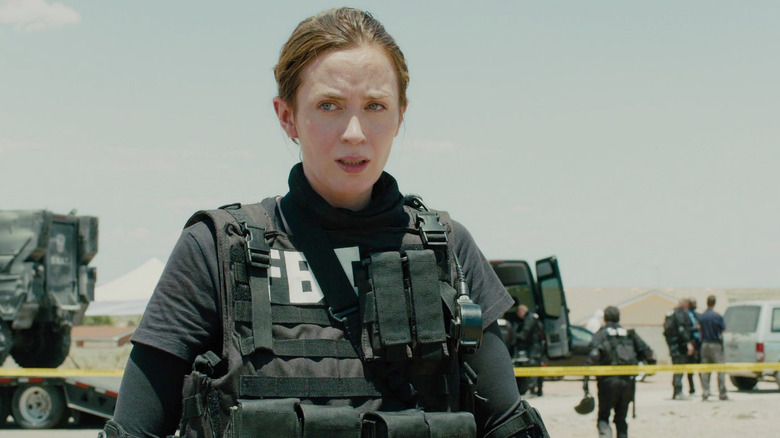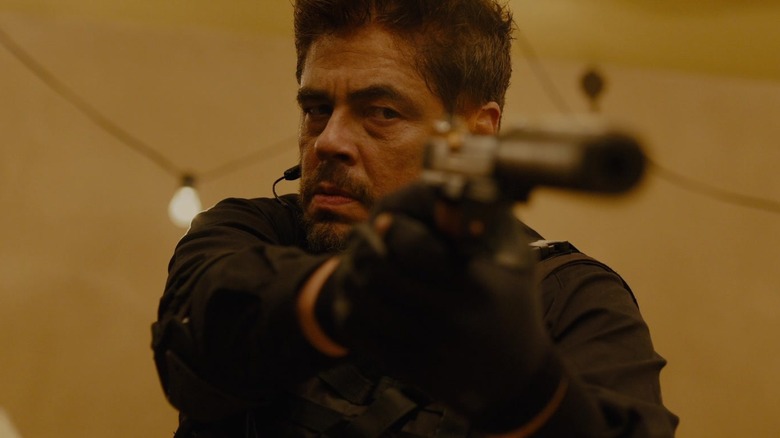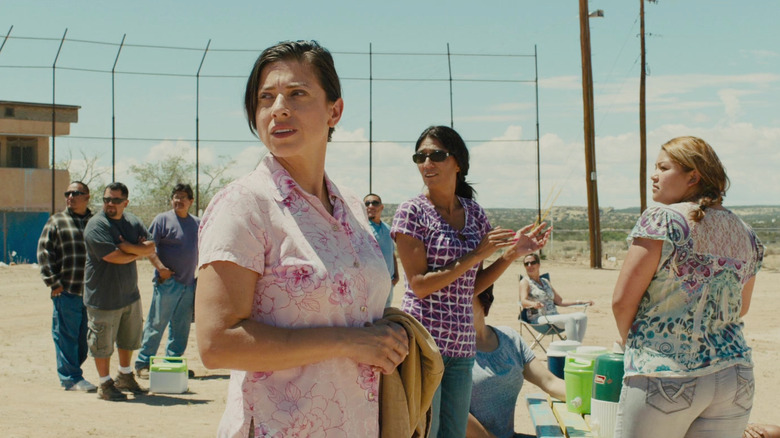The Real Themes Of Sicario, According To Taylor Sheridan
In June 1971, President Richard Nixon declared war on drugs. Over 50 years later, the general consensus is that it is a very expensive conflict that the United States is losing. Measuring the true efficiency of such a far-ranging and complex policy is difficult, but what we do know is that over a trillion dollars has been spent while drug use in the United States has continued to rise and deaths related to opioid overdose have skyrocketed, just to mention three quantifiable measures. A Gallup poll conducted in 2021 revealed that 64% of Americans believed that the nation's drug problem was very serious at best.
The War on Drugs is a huge topic, and movies about narcotics and smuggling have become a kind of sub-genre of their own over the decades. Trafficking was lurking in the background of Orson Welles' "Touch of Evil," set in a U.S.-Mexico border town, and Cheech and Chong drove a van (technically) made out of weed from Tijuana to Los Angeles in "Up in Smoke." "Scarface" was Oliver Stone's response to President Ronald Reagan escalating the War on Drugs in the early '80s, which the director regarded as "bulls**t." Drug and cartel-related media have boomed even more since around the turn of the century, with the likes of "Blow," "Traffic," "Breaking Bad," and "American Made," to name just a few titles.
Denis Villeneuve gave us one of the best in recent years with "Sicario." Based on a screenplay by Taylor Sheridan, it details a new boundary on the modern-day American frontier. This is something that Sheridan has explored in three films, "Sicario," "Hell or High Water," and "Wind River," which have become known as the "American Frontier Trilogy." Sheridan wrote the screenplay for all three and directed the last, positioning him as a thoughtful writer and filmmaker who makes gripping popular movies that tap into serious socio-political concerns. "Sicario" specifically focuses on the War on Drugs front, set in the deadly world of Mexican cartels and shadowy counter-ops. On the surface, it's a steely crime thriller, but the subject matter also gave Sheridan a platform to touch upon some deeper themes.
The deeper themes of Sicario, according to Taylor Sheridan
"Sicario" focuses on three main characters. Kate Macer (Emily Blunt) is an ambitious FBI agent hired by Matt Graver (Josh Brolin) to join an inter-agency task force to bring down a powerful Mexican cartel. Also along for the ride is Alejandro Gillick (Benicio del Toro), a former prosecutor-turned-hitman with shadowy motivations. The bleakness of the War on Drugs is all-encompassing, dumping us in the middle of a conflict in which our protagonists can barely figure out the rules, let alone win. The futility of the situation also provides the backdrop for larger themes that Taylor Sheridan worked into his screenplay, as he explained in an interview with Variety:
"The landscape is cartels and the drug war. But that's not really what the movie's about. It's really a broader philosophical question of what is the rule of law? Who adheres to it and do the ends justify the means? What is the consequence of a consumer nation and that appetite? Those are the things that I was really exploring, and this, coincidentally, provides the perfect landscape to explore all of them."
Sheridan spent time talking to real-life intelligence agents while researching the project. His conversations helped him develop a hypothetical scenario in which law enforcement turns into military intervention in order to satisfy dubious ends not all that far removed from the activities of the cartels. Given what we know about shady black ops and questionable American foreign policy in real life, it doesn't seem too far-fetched.
That's just on the American side of the border. "Sicario" also gives us a brief but disturbing glimpse of how cartels rule with an iron fist during a smash-and-grab raid on Mexican soil. This is something that feeds into another idea Sheridan wanted to make explicit, namely, the pervasiveness of violence in the drug trade.
It was literally, to me, the most shocking thing about the architects of the drug trade, their willful use of violence as a method of doing business. And it's literally that impersonal to them. Effective ways of using violence to control a populace — that's what they do. And it isn't just killing. It's killing and mutilating, displaying — it's terrorism, essentially, except it's not to achieve a political goal, it's to make money. It's a multi-billion-dollar-a-year industry. There are guys on the Forbes 400 list because of their involvement in the drug trade.
So, what happens in Sicario?
"Sicario" may well be Denis Villeneuve's best-directed film to date. His subdued and clear-eyed view lends an almost documentary-style feel to the drama, which combines seamlessly with solid action set pieces and committed performances from Emily Blunt, Benicio del Toro, and Josh Brolin. Perhaps reflecting Kate Macer's situation, Taylor Sheridan's screenplay gives us a lot of detail that comes across clearly line-by-line but turns into a daunting buzz. While Macer is part of the operation, she is very much a pawn, receiving information on a need-to-know basis. Ultimately, this leads to her becoming unwitting bait for some very dangerous people indeed.
"Sicario" is an engrossing film, but it is rather remote from a dramatic standpoint. This boils down to the fact that Macer has almost no agency and gets swept away by events beyond her control. That's a deliberate choice on Sheridan's part but she's essentially Alice in a flak jacket, acting as an audience surrogate as she disappears further down the rabbit hole — almost literally towards the end of the movie. We don't get much of a feel for Matt Graver, either, who has been compared to Robert Duvall's Kilgore in "Apocalypse Now," just loving his best life in the middle of a situation that most regular people would find totally hellish.
Far more interesting is Gillick, who is the only character in "Sicario" who has a traditional thriller arc and would later become the chief protagonist in the sequel, "Sicario: Day of the Soldado." Sheridan bravely inverts our expectations when the narrative shifts to his quest later in the film. We are encouraged to empathize with him as he seeks revenge, only to be left totally cold when his methods turn out just as monstrous as the villains.
This gives us the feeling that no matter which side you're on in the War on Drugs, it will most likely consume you. Graver's existence revolves around his job as a CIA spook and Gillick has become the antithesis of his original career choice as a prosecutor. On a larger scale, there is Sheridan's earlier point about a "consumer nation." It really boils down to the supply and demand, which has made trafficking drugs into the United States a multi-billion-dollar business. As long as there are customers, suppliers will always find a way to give people their fix.


